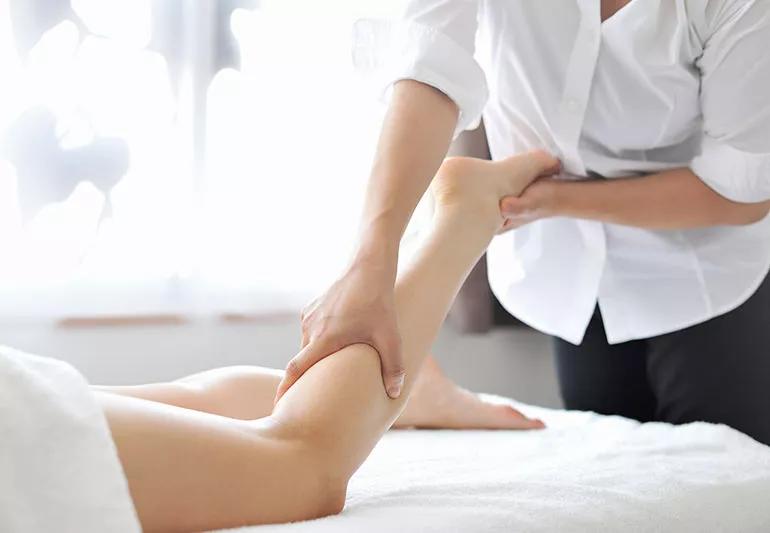It doesn't just involve your muscles!

Image content: This image is available to view online.
View image online (https://assets.clevelandclinic.org/transform/1a1f9753-a969-4ff8-b381-9c999d9f45bd/MassageTherapy_173046037_jpg)
getting a massage
How long have people been enjoying massages? For centuries! Evidence can be found in Egyptian tombs and ancient Chinese medical texts.
Advertisement
Cleveland Clinic is a non-profit academic medical center. Advertising on our site helps support our mission. We do not endorse non-Cleveland Clinic products or services. Policy
Today’s massage therapists manipulate tissue to achieve deep relaxation and to promote healing. Applying skillful touch and pressure, they help treat injuries and health problems and enhance wellness.
But some myths about massage therapy persist. Below, massage therapist Tracy L. Segall, MSHS, LMT, helps counter misconceptions.
Fact: All massage serves a purpose. Relaxation massage does just that; its intent is to relax your mind and body. Massage therapy in a clinical or hospital setting is given by licensed professionals who are trained to find and focus on problem areas.
You may come in with backache, for example, and learn that the problem begins in your ankles. Massage therapy promotes healing and, when combined with help from other medical professionals, may improve the results of your treatment.
Fact: Massage does more than manipulate muscles. Massage can stretch tightened areas of the fascia, a seamless tissue layer connecting muscles, bones and organs. Massage can manually move fluids to loosen joints, reduce swelling and make movement easier. Fluid build-up in arthritic joins may be reduced, alleviating swelling and pain. Massage can also improve the flow of lymph — a fluid that normally moves through the body to fight infection — by reducing painful swelling. Massage may help increase circulation of the blood, which moves nutrients and waste products through the body and speeds healing.
Advertisement
Fact: A good massage therapist does more than address temporary aches and pains. They want you to be as comfortable as possible after the massage’s effects wear off.
Muscles have a long memory. Holding them in an awkward position — such as craning your neck forward to see a computer at work — can cut off nerve pathways. This triggers neck and shoulder tension, upper back pain, and sometimes numbness and tingling down through the hands. Regular massages let a therapist address your pain patterns and re-educate muscles to improve body mechanics and posture.
Fact: Massage therapy is a complementary treatment for migraine headaches. Applying pressure to trigger points in the neck, shoulders, head and even face can help release muscle tension and interrupt pain signals referring to migraine areas. Massage can release tension that disrupts the blood vessels supplying the brain. Problems in the way these blood vessels function are believed to produce migraine symptoms, such as severe headache, visual disturbances, nausea and light sensitivity.
Fact: Speak up! You may feel uncomfortable while a massage therapist applies deep pressure to release a “knot” of muscle tissue. Sensations that are painful should feel therapeutic — like something good is happening. But don’t hesitate to talk to your massage therapist about anything overly painful. They will want to know and will make adjustments accordingly.
Advertisement

Sign up for our Health Essentials emails for expert guidance on nutrition, fitness, sleep, skin care and more.
Learn more about our editorial process.
Advertisement
Medical massage is tailored to your health needs to help you recover
By focusing directly on your pain points, you may find short- and long-term relief with this type of massage
This treatment may reduce stress, relieve pain and allergy symptoms, and help with sinus pressure
The same things you do to treat sore muscles after exercise can help treat soreness after a massage
Focused on stretching and yoga poses, it can increase flexibility and ease back pain
These percussive devices can help relax muscles when seeing a masseuse isn’t an option
A whole-body practice that undoes the effects of gravity and repetitive motions
A massage can release stress, soothe muscles and alleviate pain
Prioritize your health by managing stress, strengthening your social connections and getting quality sleep
Bolsters, blankets, pillows and blocks can offer extra support, stability and comfort
Allergies, postnasal drip, asthma or reflux could be to blame for a cough that won’t quit